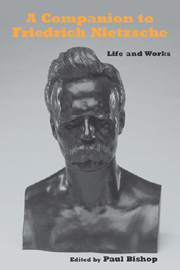Book contents
- Frontmatter
- Contents
- Acknowledgments
- A Note on Editions and Abbreviations
- Introduction
- Link to Nietzsche's Early Writings
- Link to The Birth of Tragedy
- Link to Untimely Meditations
- Link to Human, All Too Human
- Link to Daybreak
- Link to The Gay Science
- Link to Zarathustra
- Link to Beyond Good and Evil
- Link to On the Genealogy of Morals
- Link to The Case of Wagner and Nietzsche contra Wagner
- Link to Twilight of the Idols, The Anti-Christ, and Ecce Homo
- 11 Twilight of the Idols
- 12 The Anti-Christ
- 13 Ecce Homo
- 14 Dithyrambs of Dionysos
- Link to the Nachlass
- Conclusion
- Notes on the Contributors
- Index
13 - Ecce Homo
from Link to Twilight of the Idols, The Anti-Christ, and Ecce Homo
Published online by Cambridge University Press: 05 February 2013
- Frontmatter
- Contents
- Acknowledgments
- A Note on Editions and Abbreviations
- Introduction
- Link to Nietzsche's Early Writings
- Link to The Birth of Tragedy
- Link to Untimely Meditations
- Link to Human, All Too Human
- Link to Daybreak
- Link to The Gay Science
- Link to Zarathustra
- Link to Beyond Good and Evil
- Link to On the Genealogy of Morals
- Link to The Case of Wagner and Nietzsche contra Wagner
- Link to Twilight of the Idols, The Anti-Christ, and Ecce Homo
- 11 Twilight of the Idols
- 12 The Anti-Christ
- 13 Ecce Homo
- 14 Dithyrambs of Dionysos
- Link to the Nachlass
- Conclusion
- Notes on the Contributors
- Index
Summary
IN THE FINAL APHORISM in the first section of Twilight of the Idols (Götzen-Dämmerung) Nietzsche tells us: “Formula of my happiness: a Yes, a No, a straight line, a goal …” (Formel meines Glücks: ein Ja, ein Nein, eine gerade Linie, ein Ziel …; TI “Sayings and Arrows” §44; KSA 6, 66). How Nietzsche chose his path through life, abandoning the zig-zag of his academic, Wagnerian, decadent path for the straight line of his philosophy, which says “yes” (and hence also says “no”: by affirming one thing, it also “renounces” another), and how he did so in an exemplary fashion, is the story that he tells in Ecce Homo. And he tells it by writing about his life as if this had been the case, so whether his account is (f)actually, (auto)biographically true becomes irrelevant. In the beautiful passage that acts as a prooemium to the work, standing between the foreword and the first chapter, Nietzsche (echoing Zarathustra) proposes to tell himself his life —
How should I not be grateful to my whole life? And so I tell myself my life
[Wie sollte ich nicht meinem ganzen Leben dankbar sein? Und so erzähle ich mir mein Leben]
- Type
- Chapter
- Information
- A Companion to Friedrich NietzscheLife and Works, pp. 361 - 390Publisher: Boydell & BrewerPrint publication year: 2012



